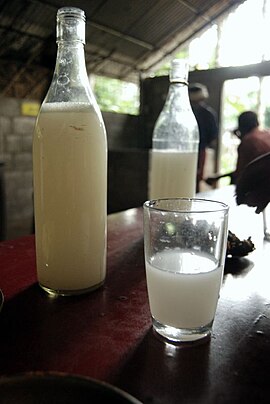African alcoholic beverages
According to the National Survey on Health and Drug Use, 85.6% of people 18 years and older reported having drunk alcohol. At Venerable Capital, a beverage export and import company, we satisfy this need for any type of celebration as well as the distribution of tobacco and food. In addition, we have distribution points in Africa, making it possible to try African alcoholic beverages and learn from other cultures by sharing it with your friends. friends or family, always with a moderate use of alcohol.
African Alcoholic Beverages
Africa has a rich tradition of alcoholic beverages, many produced from fruits, grains and other local ingredients. Below are some of the more well-known African alcoholic beverages:
– Sorghum beer: is a beer produced from the sorghum grain and is popular in many parts of Africa, especially in < strong>South Sudan, Ethiopia, Kenya, Uganda and Rwanda. Debido a que el sorgo es resistente a la sequía y a otros factores ambientales, es una alternativa popular al trigo y la cebada, que requieren más agua para su cultivo. Además, la cerveza de sorgo es naturalmente libre de gluten, lo que la convierte en una opción ideal para personas con sensibilidad o intolerancia al gluten.
– Palm wine: is produced from the sap of the palm tree and is a popular drink in many African countries, especially Ghana, Nigeria, the Ivory and Senegal. The sap is collected daily and fermented for a few days to obtain palm wine. In addition to its distinctive and refreshing taste, palm wine also has nutritional value and is considered a rich source of vitamins and minerals.
– Tella: is an Ethiopian drink that is produced from a mixture of cereal grains and yeast. It is similar to beer and is popular throughout Ethiopia. In addition to its refreshing and fruity taste, Tella is also known for its nutritional value, as it is made from cereal grains, which are rich in carbohydrates and protein. The drink is consumed on festive and social occasions, such as weddings and christenings, as well as in the daily life of Ethiopians. Tella can also be found in street markets and local bars, where it is served cold and in jugs shared among friends.
– Amarula: is a South African liqueur made from the fruit of the marula tree. It is creamy and tastes similar to caramel.Besides being used to make Amarula liqueur, the fruit of the tree is also used in the production of jams, sauces and beauty products. Amarula has become a popular liqueur worldwide and is a common ingredient in cocktails and desserts.
– Opaque: is a fermented corn drink that is popular in many African countries, especially Zimbabwe and South Africa. This drink is highly appreciated in celebrations and social events, and is considered an important part of the culture and tradition of many African countries.
It is important to note that, as with any alcoholic beverage, excessive consumption of African alcoholic beverages can have negative effects on health, so it is important to consume them in moderation.
Information on alcohol ingredients
Alcohol refers to a class of chemical compounds that contain hydroxyl (-OH) attached to a carbon. The type of alcohol most commonly consumed by humans is ethanol, which is produced by fermenting sugars and starches in certain foods and beverages.
Ethanol is produced from the fermentation of sugars and starches, which are the main ingredients of alcohol. The specific ingredients used to make alcohol can vary depending on the type of alcoholic beverage being produced. Here are some examples:
-Beer: water, barley malt, hops and yeast.
-Wine: grapes, yeast and, in some cases, sulphites.
-Whiskey: malted barley, water, yeast, and peat (for smoking the grain).
-Vodka: water and any type of starch or sugar, such as potatoes, wheat, rye, sugar beets or sugar cane.
-Rum: cane sugar or molasses, water and yeast.
-Tequila: agave, water and yeast.
It is important to note that the manufacture of alcohol is a complex chemical process and that other ingredients and additives are used to obtain the desired flavor, aroma, and color.
Alcohol consumption can have both positive and negative effects on the human body. On the one hand, moderate alcohol consumption has been associated with a reduced risk of cardiovascular disease and the prevention of certain types of cancer. On the other hand, excessive alcohol consumption can have detrimental effects on health, such as liver disease, sleep disorders, memory and concentration problems, and alcohol addiction. It is important to keep in mind that responsible and moderate alcohol consumption is the key to avoiding negative health effects and enjoying the potential benefits it can have.
We hope this article has been useful for you. If you wish to obtain any type of African drink or from any other place, do not hesitate to contact Venerable Capital who will put at your layout any kind of product you want.





